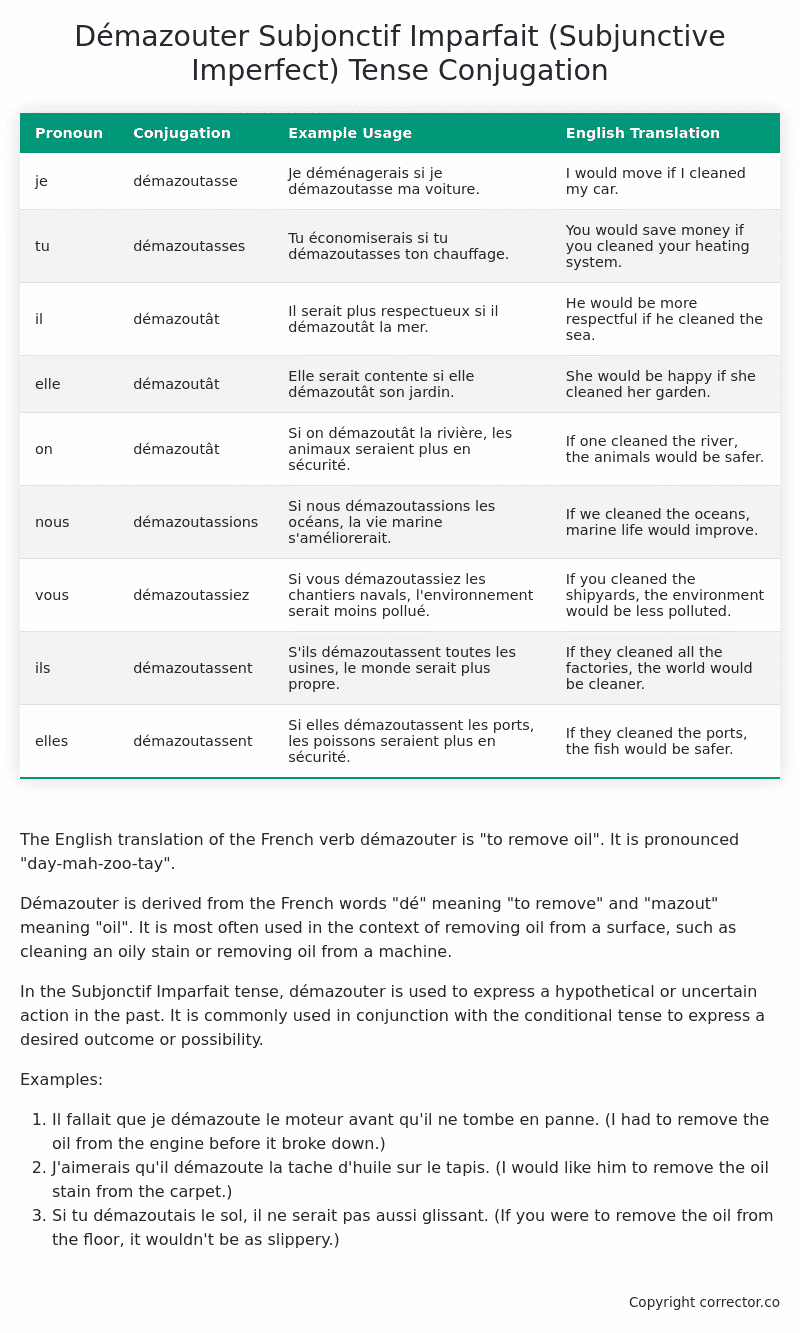Subjonctif Imparfait (Subjunctive Imperfect) Tense Conjugation of the French Verb démazouter
Introduction to the verb démazouter
The English translation of the French verb démazouter is “to remove oil”. It is pronounced “day-mah-zoo-tay”.
Démazouter is derived from the French words “dé” meaning “to remove” and “mazout” meaning “oil”. It is most often used in the context of removing oil from a surface, such as cleaning an oily stain or removing oil from a machine.
In the Subjonctif Imparfait tense, démazouter is used to express a hypothetical or uncertain action in the past. It is commonly used in conjunction with the conditional tense to express a desired outcome or possibility.
Examples:
- Il fallait que je démazoute le moteur avant qu’il ne tombe en panne. (I had to remove the oil from the engine before it broke down.)
- J’aimerais qu’il démazoute la tache d’huile sur le tapis. (I would like him to remove the oil stain from the carpet.)
- Si tu démazoutais le sol, il ne serait pas aussi glissant. (If you were to remove the oil from the floor, it wouldn’t be as slippery.)
Table of the Subjonctif Imparfait (Subjunctive Imperfect) Tense Conjugation of démazouter
| Pronoun | Conjugation | Example Usage | English Translation |
|---|---|---|---|
| je | démazoutasse | Je déménagerais si je démazoutasse ma voiture. | I would move if I cleaned my car. |
| tu | démazoutasses | Tu économiserais si tu démazoutasses ton chauffage. | You would save money if you cleaned your heating system. |
| il | démazoutât | Il serait plus respectueux si il démazoutât la mer. | He would be more respectful if he cleaned the sea. |
| elle | démazoutât | Elle serait contente si elle démazoutât son jardin. | She would be happy if she cleaned her garden. |
| on | démazoutât | Si on démazoutât la rivière, les animaux seraient plus en sécurité. | If one cleaned the river, the animals would be safer. |
| nous | démazoutassions | Si nous démazoutassions les océans, la vie marine s’améliorerait. | If we cleaned the oceans, marine life would improve. |
| vous | démazoutassiez | Si vous démazoutassiez les chantiers navals, l’environnement serait moins pollué. | If you cleaned the shipyards, the environment would be less polluted. |
| ils | démazoutassent | S’ils démazoutassent toutes les usines, le monde serait plus propre. | If they cleaned all the factories, the world would be cleaner. |
| elles | démazoutassent | Si elles démazoutassent les ports, les poissons seraient plus en sécurité. | If they cleaned the ports, the fish would be safer. |
Other Conjugations for Démazouter.
Le Present (Present Tense) Conjugation of the French Verb démazouter
Imparfait (Imperfect) Tense Conjugation of the French Verb démazouter
Passé Simple (Simple Past) Tense Conjugation of the French Verb démazouter
Passé Composé (Present Perfect) Tense Conjugation of the French Verb démazouter
Futur Simple (Simple Future) Tense Conjugation of the French Verb démazouter
Futur Proche (Near Future) Tense Conjugation of the French Verb démazouter
Plus-que-parfait (Pluperfect) Tense Conjugation of the French Verb démazouter
Passé Antérieur (Past Anterior) Tense Conjugation of the French Verb démazouter
Futur Antérieur (Future Anterior) Tense Conjugation of the French Verb démazouter
Subjonctif Présent (Subjunctive Present) Tense Conjugation of the French Verb démazouter
Subjonctif Passé (Subjunctive Past) Tense Conjugation of the French Verb démazouter
Subjonctif Imparfait (Subjunctive Imperfect) Tense Conjugation of the French Verb démazouter (this article)
Subjonctif Plus-que-parfait (Subjunctive Pluperfect) Tense Conjugation of the French Verb démazouter
Conditionnel Présent (Conditional Present) Tense Conjugation of the French Verb démazouter
Conditionnel Passé (Conditional Past) Tense Conjugation of the French Verb démazouter
L’impératif Présent (Imperative Present) Tense Conjugation of the French Verb démazouter
L’infinitif Présent (Infinitive Present) Tense Conjugation of the French Verb démazouter
Struggling with French verbs or the language in general? Why not use our free French Grammar Checker – no registration required!
Get a FREE Download Study Sheet of this Conjugation 🔥
Simply right click the image below, click “save image” and get your free reference for the démazouter Subjonctif Imparfait tense conjugation!

Démazouter – About the French Subjonctif Imparfait (Subjunctive Imperfect) Tense
Formation
Common Everyday Usage Patterns
Interactions with Other Tenses
Subjonctif Présent
Indicatif Passé Composé
Conditional
Conditional Perfect
Summary
I hope you enjoyed this article on the verb démazouter. Still in a learning mood? Check out another TOTALLY random French verb conjugation!


